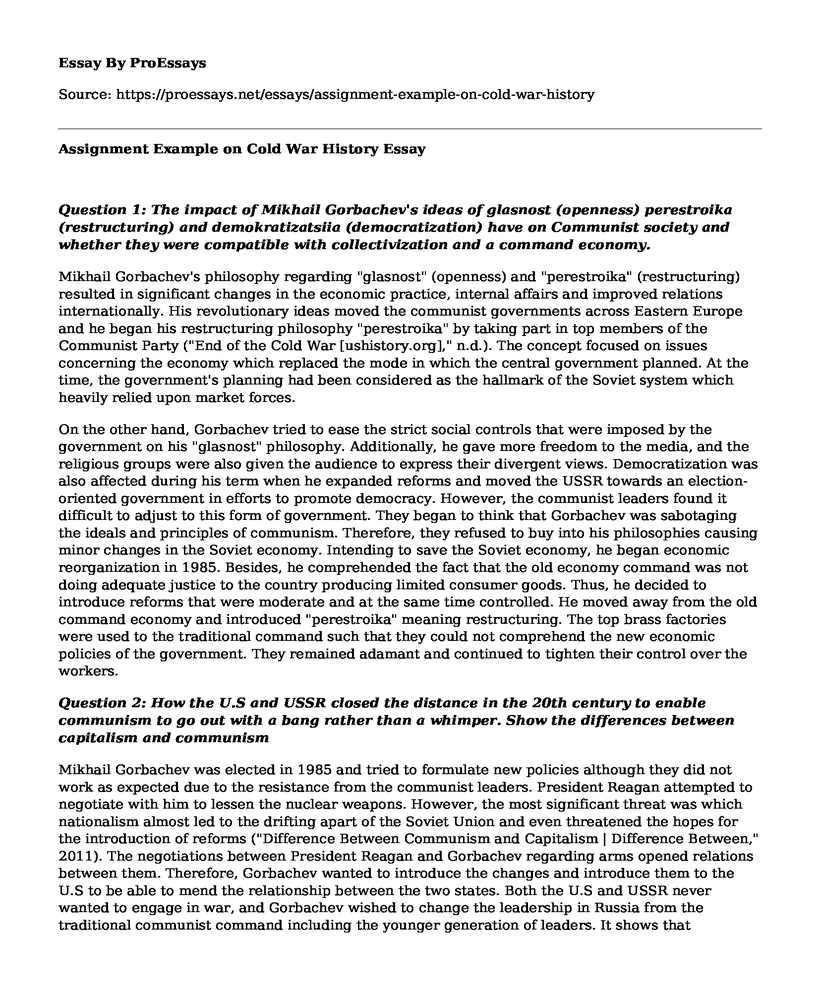Question 1: The impact of Mikhail Gorbachev's ideas of glasnost (openness) perestroika (restructuring) and demokratizatsiia (democratization) have on Communist society and whether they were compatible with collectivization and a command economy.
Mikhail Gorbachev's philosophy regarding "glasnost" (openness) and "perestroika" (restructuring) resulted in significant changes in the economic practice, internal affairs and improved relations internationally. His revolutionary ideas moved the communist governments across Eastern Europe and he began his restructuring philosophy "perestroika" by taking part in top members of the Communist Party ("End of the Cold War [ushistory.org]," n.d.). The concept focused on issues concerning the economy which replaced the mode in which the central government planned. At the time, the government's planning had been considered as the hallmark of the Soviet system which heavily relied upon market forces.
On the other hand, Gorbachev tried to ease the strict social controls that were imposed by the government on his "glasnost" philosophy. Additionally, he gave more freedom to the media, and the religious groups were also given the audience to express their divergent views. Democratization was also affected during his term when he expanded reforms and moved the USSR towards an election-oriented government in efforts to promote democracy. However, the communist leaders found it difficult to adjust to this form of government. They began to think that Gorbachev was sabotaging the ideals and principles of communism. Therefore, they refused to buy into his philosophies causing minor changes in the Soviet economy. Intending to save the Soviet economy, he began economic reorganization in 1985. Besides, he comprehended the fact that the old economy command was not doing adequate justice to the country producing limited consumer goods. Thus, he decided to introduce reforms that were moderate and at the same time controlled. He moved away from the old command economy and introduced "perestroika" meaning restructuring. The top brass factories were used to the traditional command such that they could not comprehend the new economic policies of the government. They remained adamant and continued to tighten their control over the workers.
Question 2: How the U.S and USSR closed the distance in the 20th century to enable communism to go out with a bang rather than a whimper. Show the differences between capitalism and communism
Mikhail Gorbachev was elected in 1985 and tried to formulate new policies although they did not work as expected due to the resistance from the communist leaders. President Reagan attempted to negotiate with him to lessen the nuclear weapons. However, the most significant threat was which nationalism almost led to the drifting apart of the Soviet Union and even threatened the hopes for the introduction of reforms ("Difference Between Communism and Capitalism | Difference Between," 2011). The negotiations between President Reagan and Gorbachev regarding arms opened relations between them. Therefore, Gorbachev wanted to introduce the changes and introduce them to the U.S to be able to mend the relationship between the two states. Both the U.S and USSR never wanted to engage in war, and Gorbachev wished to change the leadership in Russia from the traditional communist command including the younger generation of leaders. It shows that communism was allowed to go out with a whimper and not a bang.
Moreover, communism and capitalism have several differences concerning political ideologies. Firstly, a communist society solely owns all the resources or the means of production while capitalism the resources belong exclusively to the private owner. Secondly, profit is equally shared in a communist society and on the other hand, profit only pertains to the individual owner. Thirdly, in a communist society, the economy is government controlled. For capitalist societies, the economy is self-regulated. Therefore, the two ideologies are a complete contrast of each other such that they can never go together.
References
Difference Between Communism and Capitalism | Difference Between. (2011, May 19). Retrieved August 15, 2018, from http://www.differencebetween.net/miscellaneous/difference-between-communism-and-capitalism/
The End of the Cold War [ushistory.org]. (n.d.). Retrieved August 15, 2018, from http://www.ushistory.org/us/59e.asp
Cite this page
Assignment Example on Cold War History. (2022, Jul 11). Retrieved from https://proessays.net/essays/assignment-example-on-cold-war-history
If you are the original author of this essay and no longer wish to have it published on the ProEssays website, please click below to request its removal:
- Essay Sample on Gilded Age Tycoons
- Criminal Investigation on the War Crime Paper Example
- Development of the Cold War - Essay Sample
- Essay Sample on American Revolution: A New Beginning of US Religious History
- Essay Example on Abraham Lincoln: A Remarkable President and His Legacy
- Essay Example on Texas Independence: From Mexico to the U.S. (1821-1835)
- The Great Recession: 10 Years of Economic Disparity - Essay Sample







